"Although
I am no better than a beast, don't I have the right to live?" |
Oh Dae-su |
Oldboy
was I film I really wanted to see some time before I got
the chance to do so. It had two great hooks. The first
was that it was directed by Park Chan-wook, whose Sympathy
for Mr. Vengeance I had been bowled over by.
The second – and this is so crucial and yet all too rare
these days – is that even a cursory outline of the plot
made it sound fascinating. This was a story that I wanted
to see and hear played out on screen. Put those two factors
together and you've got a damned good sell. By the time
I got to see it a third hook had been added in the shape
of phenomenal word-of-mouth. People were going nuts for
the film and it won the Grand Prix at Cannes. And it was
reaching a sizeable audience far beyond its home turf.
I
would imagine that a good many of you have seen the film,
or at the very least know of it. It has, as they say, something
of a reputation, for its central performance, for its violence,
for the dark places it dares to take the viewer. Mind you,
those last two will hardly come as a surprise to anyone
familiar with Park's previous film, the first installment
of what has since become known as his Vengeance Trilogy. That film's gentle pace and offbeat comic moments left you unprepared for the grim twists that the plot later takes, and
when the violence did come it was genuinely shocking, even though
most of it was delivered just out of view. The same is true for
Oldboy. Although notorious for its brutality,
it's not what is shown that is so disturbing but how people
behave, what they do to each other in the name of revenge.
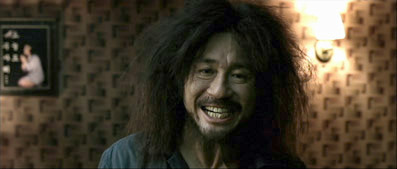
So
about that second hook...
One
night, after a drunken spell at a police station, businessman
and family man Oh Dae-su is kidnapped and imprisoned in
a secure apartment with no windows and a manic-depressive
décor. He doesn't know who his
captors are and no-one talks to him to explain where he
is or why he is there. He's given food through a slot in
the door, is intermittently gassed and groomed by his unseen
captors, and his only link with the outside world is a television
set, which becomes both his teacher and substitute lover. One
of the first things it informs him is that his wife has
been murdered and that he is the prime suspect. Madness
looms, but drugs are administered to keep him sane.
And
he's held there for fifteen years.
His
release into the outside world is both unexpected and mysterious.
An unknowing courier then hands him some money and a mobile phone, which his unidentified nemesis uses to communicate with him.
Desperate to know the man's identity, Dae-su is given just five
days to uncover the reason for his imprisonment and enact
the revenge he has been planning for years.
The
dramatic pace change from Sympathy for Mr. Vengeance
is marked by an opening scene in which silhouetted Dae-su
is dangling a terrified man by his tie over the edge of
a tower block roof, set to a driving beat that suggests
we have landed in the middle of an action sequence. He relates
the story of his imprisonment to us and the dangling man,
a nervous, would-be suicide whom he then leaves to carry out
his planned death leap. He soon finds himself in a scrap with a
gang of would-be hard-nuts and beats them silly. TV has taught him
how to fight. Drawn to a particular restaurant, he
meets young female sushi chef Mi-do and ends up back at
her place, where his clumsy attempts at seduction are firmly
rebuffed. At least for now.
If
the plot hasn't grabbed your attention by now (and it bloody
well should have) then Park's handling certainly will. This
is dynamic direction with purpose, placing us in the thick
of Dae-su's experience in a manner beyond the vocalled recalled memories to the subject of his first post-incarceration
human encounter. His despair, fury, confusion, and borderline
insanity are vividly realised, his transformation into a
machine of vengeance believably but economically portrayed,
no mean feat when you realise the script was based on a
Manga comic by Minegeshi Nobuaki and Garon Tsuchiya.
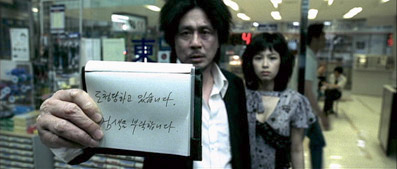
Although
the post-imprisonment setup may have a familiar ring –
a manhunt with a time limit and few clues where to start
– little about how this plays out is by the book. As
Dae-su starts to connect the dots, we are never allowed to
get one step ahead of his investigations, and thus share
his surprise at the frequent and genre-busting plot turns.
Nothing is laid out on a plate and there is a delicious
economy to the filmmaking that allows Park to cram the screen
with incident and character detail and shift things along
at a pace that requires your full attention to follow.
Dae-su's two early suicide attempts while incarcerated, for example, are
represented by glass from a broken mirror and a top-shot of
Dae-su being dragged across the floor – you have to be alert
to spot the bleeding wrist and fresh bloodstain on the floor,
at least on a modestly-sized TV screen.
The
film shares with Mr. Vengeance an ability
to repeatedly catch the audience out, and a storyline and
approach that robs revenge of its cinematically traditional
cathartic pleasures. Where the two films part company is in their
technique, with the static, almost observational approach of the earlier
work replaced by drifting camera movements and an accelerated
editing style, moving the narrative along at a speed that rivals
any modern Hollywood thriller but with an intelligence,
purpose and daring that leaves them standing. That's not
to say the American influence is not there – the film's
postmodernist ticks have their routes in US independent
cinema and have no doubt contributed to its breakthrough
international appeal.
Memorable
scenes follow in rapid succession, the most striking of
which has to be Dea-su's ferocious, hammer-swinging corridor
battle with a large group of heavies, all done in a single,
two-and-a-half-minute sideways-on long shot, a brilliantly
choreographed and yet gruellingly realistic fury-fired fight
for survival. Mind you, most viewers tend to wince at the
vivid memory of the most horrible tooth torture scene since
Marathon Man, and the image of Dae-su
chewing away at a live squid as its tentacles cling to his
face and hand is one that has haunted every Japanese seafood
experience I have had since.
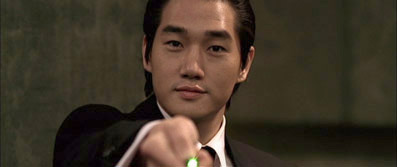
The
performers all shine, but as Oh Dae-su, Choi Min-sik is
just stupendous, his stony-faced detachment when inflicting
hurt with a hammer giving way to heart-rending despair and
a manic explosion of emotional desperation in a climax that
is almost as draining to watch as it clearly was to perform.
This should not overshadow the very considerable
contributions of co-stars Lee Woo-jin and Kang Hye-jeong
as Yu Ji-Tae and Mi-do respectively, Lee's playful malevolence
in particular adding to the frustration factor of Dae-su's
quest. And special mention should go to Kim Byeong-ok, who
as the white-haired bodyguard Mr. Han manages to suggest
with very little that behind his unhurried cool lies a creature capable to
taking out a pride of lions with a single blow.
It's
not hard to see why Oldboy struck a particular
chord with western film fans. It has the tonal and visual
darkness of Se7en-era David Fincher and
the effortless cool of pre-Jackie Brown
Tarantino – it's no surprise that Tarantino was head of the Cannes
jury that awarded the film the Grand Prix. Having been so
stricken by Sympathy for Mr. Vengeance,
I found myself initially not quite as dazzled by Oldboy,
preferring the first film's steely calm to the more crowd-pleasing
kinetic approach of its follow-on. But several viewings
in I happily regard the two films as artistic equals, brothers
in a cause that take alternative approaches to similar narrative goals. Both films are fiercely original, surprising and inventive
in ways that demonstrate just why Korean cinema is being
held in such high regard, and both thematically darker
than anything currently escaping from studios in the West.
Oldboy is powerful, exciting cinema, and
by reaching beyond its home turf and finding a sizeable
cult audience around the world, could just be the most important
Korean film of recent years.
Anamorphic 2.35:1 and, unlike Tartan's discs of Sympathy
for Mr. Vengeance and Lady Vengeance,
a PAL original rather than an NTSC transfer. Picture quality
is good within the restrictions imposed on it by the bleach
bypass process used in the developing stage, which knocks
detail out of the whites, giving them an overexposed, almost
digital look. The dominance of green-browns in many scenes
is coped with well, and detail is consistently good.
The
three soundtracks on offer are all effective in their way – the
stereo 2.0 track has nice clarity and separation, the Dolby
5.1 EX surround track uses the surrounds well and adds a
fullness and depth to the music, but switch to the DTS-ES
surround 6.1 after having either of these tracks on loud
and you're likely to lose a window. For clarity, volume
and punch, this is definitely the winner. Due to the subtitle
requirements of the commentary track, you can only switch
audio tracks from the audio options menu, not as the film
is playing.
Commentary
by Director Park Chan-wook
The
first of three commentary tracks – all conducted in Korean
with English subtitles – is a solo run for the director and Park has plenty to say, with the result that there's
hardly a pause here. There's a nice mix of technical
and background information with plenty of sometimes anecdotal
asides, although there's also a some pointing out of the
obvious. Of particular interest is the version prepared
for TV, which simply cannot deliver the punch the original
cut does, and the director's original intention to make
the imprisonment sequence "disgustingly long."
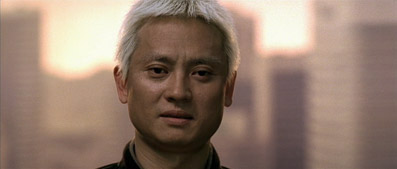
Director
and Cinematographer Commentary
I was expecting some serious duplication of Park's solo
commentary here, but Park and cinematographer Chung Chung-hoon
manage to cover a great deal of new ground, including detail
on the bleach bypass process used for the film and the techniques
of 'pulling' and digital colouration. Again this is
a chatty and consistently interesting track laced with dry
humour – one of my favourite bits has Chung expressing his
preference for camera movements because he feels he is doing
his job when the camera is in motion. "Sometimes,"
he says, "I nod off during the static shots."
Director
and Cast Commentary
The least technical and most light-hearted of the three commentaries
is nonetheless an enjoyable listen. Park is joined here
by lead players Choi Min-sik, Yu Ji-tae and Gang Hye-jung,
who eat sushi and engage in some lively banter, mixing memories
of the shoot and comments on scenes with the odd bit of
fun poking and even some technical details not covered in the
other two commentaries, including info on a small change
made to the soundtrack for the DVD release of the film.
Original
Theatrical Trailer (1:31)
A UK trailer and rather a neat one, with plenty of tantalising
snippets but no serious spoilers.
The
extra features on disc 2 are divided into three categories.
Behind the Scenes
Flashback
(22:57)
Fans of the film set questions that the actors and director
respond to, though not in the same location as each other.
The actors and Park also get to ask each other
a couple of questions. There is some behind-the-scenes footage
here and a brief glimpse of Gang Hye-jung's audition. My
favourite Park quote of the piece: "People say a director's
pleasure comes from tormenting the performers, and the biggest
pleasure comes when you torment the big stars."
The
Cast Remembers (10:58)
I'm sorry, the cast? They barely get a look-in
here, as Park, producer Lim Seung-yong and director of photography
Chung Chung-hoon talk about various aspects of the production,
including the bleach bypass process which was – no surprises
here – influenced by the look of Se7en.
Production
Design (13:14)
The production and costume designers discuss the look of
the film, including the use of repeating patterns, the design
of Dae-su's hair, and the influence of American Psycho
on Lee Woo-jin's wardrobe.
CGI
Featurette (7:10)
FX technical director Chung Sung-jin takes you through stages
of creating computer ants and arms, Mi-do's ant fantasy,
digital colour correction, and the digital knife in the corridor
fight, all of which is damned interesting.
The
Music Score (16:47)
Park and the film's musical director Cho Young-wook, old
friends and regular collaborators, discuss the shaping of
the score and then provide a commentary track on a number
of scenes that have been stripped of all sound except the music.
A great extra.
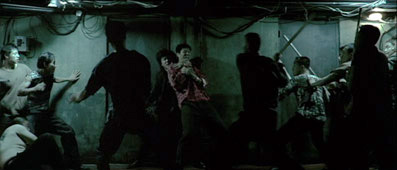
Le
Grand Prix at Cannes (8:51)
Members of the crew and cast talk about going to Cannes and winning the
Grand Prix, and there is footage of them at the festival
and the screening, which gets some serious applause. There's
no footage of the award win, though, which is a shame. A
rights issue, no doubt.
Interviews
An
intimidating list presents itself when you select this page,
but most of the actor interviews are quite brief and cover
sometimes expected but still interesting ground. The first
two with Park Chan-wook are a little more substantial.
Tartan Exclusive director interview by Mark
Salisbury (22:13)
A 22 minute interview that is actually only about 11 minutes,
as Park gives his answers in Korean and they are then translated
for us into English by an interpreter sitting beside him.
Some unsurprising questions, but Park's response to why
he is drawn to revenge stories is good, and his suggestion
that the current popularity of Korean cinema is partly down
to declining standards elsewhere struck a chord.
Park
Chan-wook (7:01)
The director answers questions to a group of what looks
like students in a screening theatre the day before he goes
to Cannes, and reveals, amongst other things, that his directing style is most influenced
by Kafka. A particularly nice moment has him wonder why
people watch mindless films – "If you want a peaceful
rest," he suggests, "have a bath. Why go to the
cinema?" I could have done with more of this.
Tsuchiya
Garon (2:18)
Co-creator of the original manga is interviewed by phone
and was clearly impressed with the film. His interview does
includes shots of the comic.
The
actor interviews are all quite brief. A busy interview with Choi
Min-sik (6:16) covers quite a bit of ground,
a fair of amount of which you won't find elsewhere on the
disc. It's all interesting and Choi speaks with clear passion.
Yoo Ji-Tae (3:55) talks about
his character and suggests one thing he would have changed
if he were playing the role again. Kang Hye-jung
(4:00) discusses landing the role of Mi-do and key aspects
of the character and playing her on screen, including her
ease at playing a sex scene. Yoon Jin-seo
(3:37) covers the preparation for her role as Soo-ah and
training with Choi Min-sik, who was clearly a mentor to
her. Chi Dae-han (3:18) discusses
his character (Joo-hwan) and his relationship with Oh Dae-su,
but also his on-set relationship with Choi Min-sik, plus
the bruising he takes when Yoo Ji-Tae got a bit over zealous
with his performance (it shows on screen, too). Kim
Byoung-ok (2:35) briefly chats about his role
as one of the coolest screen bodyguards ever, and making
the transition from stage to his first film role. Oh
Dal-soo (2:38) unsurprisingly covers being
the victim in the tooth torture scene and also touches on
his previous work with Park. Oh Kwang-Rok
(2:59) explains how he landed the role of the suicide man
(Park chips in here, too, as he does in Oh Dai-su's piece),
his interpretation of the character, and what it's like for
an acrophobic to be dangled over the edge of a high building.
Finally Lee Seung-ja (2:43) gives
us her take on her role as hypnotist Hyung-ja and her supposedly
ghostly appearance at the end.
Deleted Scenes, all with optional commentary
Oh Dae-Su (10:54)
Tantalisingly mentioned on the Director and Cinematographer's
Commentary, this is Oh Dae-su's drunken police station visit
in close to its entirety, a 10 minute improvisation by Choi
Min-sik that the other actors have to respond to. And it's
a riot, a minor comic tour-de-force that is considerably
edited down for the film (appropriately and effectively
so) but still a delight to have the chance to enjoy as a whole. On the commentary,
Park suggests he doesn't like doing audio commentaries or
showing deleted scenes, which he finds embarrassing. Doing
a commentary on deleted scenes is thus doubly painful. Nonetheless,
he does a good job on this, and provides some interesting
backstage tidbits and information of the scene's construction,
including Choi's improvisations.
Day
One (2:45)
The original start of Oh Dae-su's confinement, waking up in bed. An
interesting scene, but the actual edit, where we encounter
him three months in, works so much better. Park regrets
shooting this scene and claims to be surprised at his utter
stupidity for doing so.
Japanese
Restaurant (0:33)
A minor alteration in original edit.
Fight With the Guards (1:15)
Multi-angle, handheld camera version of the corridor fight.
Nowhere near as impressive as actual shot used.
Kiss (1:42)
A censorship-friendly replacement for hotel room sex scene,
which was the version shown on Korean TV. Passionate,
sure, but this would definitely soften the film's final sucker punch.
The
Lovers 1 (1:05)
Post-coital moment that preceded the film's only really
happy and tender exchange.
The Lovers 2 (1:19)
Alternate take on above.
Woo-jin's
Preparation (1:56)
Woo-jin rehearsing lines he will say to Oh Dae-su later,
intercut with visit to hair salon.
The Remaining Plot (1:42)
Woo-jin in shopping mall with hypnotist, planning for the
future.
Tube
Station: Reflection (1:01)
Continuation of above. The last line, which is really important,
is untranslated.
This
is one that Tartan got right first time. A great movie,
well presented and with a generous selection of very decent
extras. So if you have this, why would you think of buying
it again as part of the Vengeance
Trilogy Box Set? Ah, well there may be, just
may be, one very convincing reason.
To
read the review of the Vengeance Trilogy version, click
here.
|